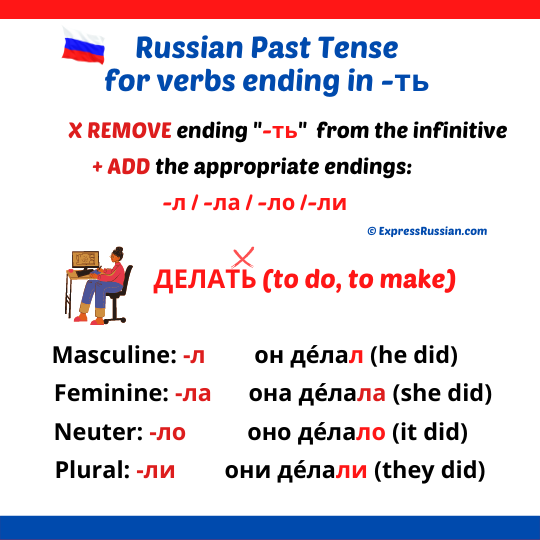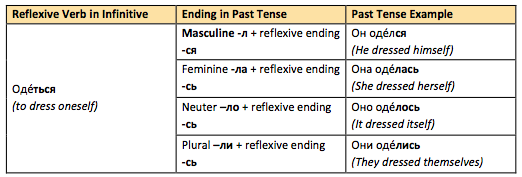In this article:
Russian Past Tense Rules
Russian Past Tense formation rules are among the simplest to remember in the Russian grammar.
Using verbs in the Past Tense, you can describe events that happened in the past (no matter when it happened: 1 minute or 1 century ago).
Hence the 1st rule:
in Russian, everything that refers to an action in the past (completed or not) should be used in the Past Tense.
This means that the same tense (Past Tense) is used to express actions for which you would use either Past Simple, Past Continuous, Past Perfect, Past Perfect Continuous or Present Perfect in English. The last one refers to past tense in Russian, because it speaks of an already finished (complete) action.

The main thing to know about Russian Past Tense
While in the Present Tense we are concerned about the person who is talking (i.e., 1st, 2nd, or 3rd person) and the type of verb conjugation (1st or 2nd), in the Past Tense we need to keep in mind the grammatical gender of the subject and the number (singular or plural).
Since the verb ending depends on gender and the number, you should check the gender of the noun in any dictionary or follow the tips in our video Gender of nouns.
There are 3 types of Russian infinitive verbs:
verbs that end in the infinitive form in –ть, in -ти or in –чь.
Verbs that end in -ти and -чь will have exceptions and irregular conjugations in the Past Tense.
Past Tense for Russian verbs ending in -ть (most of verbs)
Most verbs have –ть in the infinitive form, they follow the regular conjugation pattern and have the following endings in the Past Tense:
Masculine: -л, Feminine: -ла, Neuter: -ло, Plural: -ли
To form the Past Tense, you need to remove the ending “-ть” from the infinitive form of the Russian verb and add the following endings:
if the subject is Masculine: -л, if Feminine: -ла, if Neuter: -ло, if Plural: -ли
Let’s see on examples!

Since the subject is often a pronoun, pay attention to gender and number, and not only to the pronoun itself. For example: when “я” (me) is the subject, the verb agrees with the subject’s gender, so a man should say: “я дéлал”; a woman should say: “я дéлала”.
The same is valid for the pronoun “ты” (you). If the subject “ты” is a woman, then the feminine ending (-ла) should be used; if the subject “ты” is man, then the masculine ending (–л) should be used. Accordingly, ты дéлала (for woman) / ты дéлал (for man).
For the pronoun “вы” (you), no matter if it is used for a group of people (plural) or as a polite form of addressing one person (singular), select the plural form (–ли).
You can learn more about these and other pronouns in the article Russian Pronouns.
We have spoken about formation of Past Tense for Russian verbs ending in -ть. Other Russian verbs (ending in -ти and -чь ) will have irregular forms in the Past Tense.
Aspects in Russian & Russian Past Tense
In Russian, there is a concept of aspect, and it becomes important in past and future tenses. Aspect indicates whether an action was successfully completed or not.
How to express that an action has been completed in the past in Russian?
As there is only 1 past tense in Russian, there is a need to express somehow if the action has ended in a result or was stretched in time in the past.
Usually, Russian verbs come in pairs: imperfective aspect verb (form) and a perfective verb (form). They are given together in the dictionaries. The 2 forms differentiate themselves from each other by various prefixes, suffixes or both prefixes and suffixes.
Learn more about aspects from our Russian grammar course.
For incomplete actions, continuous, habitual actions or actions where the result is not known (not specified) – we use the imperfective aspect form.
For completed actions, one-off actions, and actions where we wanted to specifically underline the result – we need to use the perfective aspect form of the same verb.
Here are some examples:
(Imp.) Иван весь день дéлал годовой отчет. – Ivan was doing the annual report whole day. VS
(Perf.) Иван сдéлал годовой отчет за 1 рабочий день. – Ivan has finished (has done) the annual report within 1 day.
One more example with Russian verb of motion Идти in the Past Tense:
(Imp.) Я шлá домóй цéлый чáс. – I walked home for an hour / It took me 1 hour to walk home (woman speaking). VS
(Perf.) Я пошлá домóй срáзу пóсле концéрта. – I went home immediately after the show (woman speaking).
*in the example above, imperfective and perfective forms differ in prefix (по-).
Learn more about Prefixes in Russian Verbs of Motion
As you see from the examples, the perfective aspect conjugates in the same way as the imperfective aspect. The formation of Past Tense of such Russian verbs is the same for perfective and imperfective form, hence the endings are the same.
Reflexive Verbs & Russian Past Tense
Russian Reflexive Verbs are verbs with a postfix –ся / –сь. This postfix is an archaic form of the reflexive pronoun себя (self) in accusative case which merged with the initial verb, creating new meanings of the corresponding verbs.
You could think of it as a shortened version of (verb + self) construction; for example, одевáться (to dress yourself), умывáться (to wash your face).
Reflexive verbs in Russian are conjugated in the Past Tense in the same way as other verbs, except they maintain their reflexive endings (-ся or -сь).
Therefore, the endings of such verbs in the Past Tense will be: for Masculine: -лся, for Feminine: -лась, for Neuter: -лось, for Plural: -лись.

Verb “Быть” (to be) in the Past Tense in Russian
Did you know that verb “to be” is often omitted in Russian Present Tense?
In Russian Past Tense, however, the verb “to be” is fully present.
Compare:
(Present Tense) Сегóдня _пя́тница. – Today is Friday.
(Past Tense) Вчерá былá пя́тница. – Yesterday it was Friday.
Let’s conjugate the verb “быть” (to be) in Past Tense.
Note the irregular stress pattern in the feminine when using this verb.
Я был – I was (man speaking)
Я была́ – I was (woman speaking)
Ты был – You were
Он был – He was
Она́ была́ – She was
Оно́ бы́ло – It was
Мы бы́ли – We were
Вы бы́ли – You were
Они́ бы́ли – They were
Note also the unusual stress patterns when used in the negative.
The stress moves to the particle “не”, except in the feminine.
Я не́ был – I was not (man speaking)
Я не была́ – I was not (woman speaking)
Ты не́ был – You were not
Он не́ был – He was not
Она́ не была́ – She was not
Оно́ не́ было – It was not
Мы не́ были – We were not
Вы не́ были – You were not
Они́ не́ были – They were not
Related: Russian Future Tense
Russian Past Tense Exercises
Let’s conjugate simple Russian verbs in the Past Tense!
- РАБОТАТЬ (to work), imperfective aspect
Я работала в Москве (woman speaking). Я работал в Москве (man speaking).
Ты работала в Москве (woman). Ты работал в Москве (man).
Он работал в Москве.
Она работала в Москве.
Мы работали в Москве.
Вы работали в Москве.
Они работали в Москве.
- УМЫТЬСЯ (to wash one’s face), perfective aspect
Я умылась (woman speaking). Я умылся (man speaking).
Ты умылась (woman). Ты умылся (man).
Он умылся.
Она умылась.
Мы умылись.
Вы умылись.
Они умылись.

Dear Russian learners, do you want to learn in detail Russian Tenses, aspects, genders, cases and other basic rules of Russian grammar?
Join the self-paced course “Russian Grammar Made Easy” and learn Russian anytime, anywhere with ease!
CHECK THE PROGRAM BELOW:
- Russian alphabet and pronunciation
- Gender of nouns. Plural of nouns.
- Introduction to Russian cases.
- Russian verbs: aspect and tenses
- Present tense of verbs. Conjugation of verbs.
- Russian Past tense.
- Russian Future tense.
- Russian sentence structure. Word order. Negative form. Question form.
- Adjectives. List of the most common Russian adjectives and their conjugation.
- Russian pronouns.


7 replies on “Russian Past Tense”
[…] where you speak about a group of people (more than 1 person). All the conjugations (for example, verbs in past tense, verbs in future tense, adjective endings) are kept in plural […]
[…] Related: Reflexive Verbs and Russian Past Tense […]
[…] RUSSIAN PAST TENSE […]
[…] Past Tense in Russian […]
[…] Related: Russian Past Tense […]
[…] In Russian, all verbs can have 2 aspect forms – imperfective and perfective. Aspect indicates whether an action was successfully completed (perfective) or not (in this case, we use imperfective aspect form). Learn more about Aspects in the Russian language. […]
[…] Past Tense in Russian […]